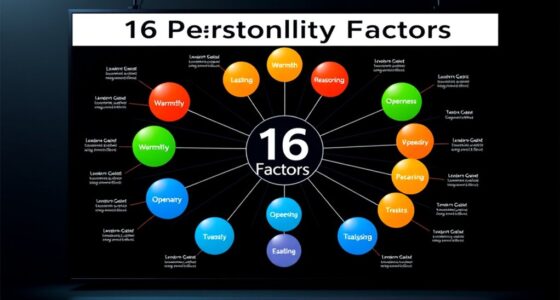Emotional stability in the 16PF reflects how well you handle stress, keep your moods balanced, and respond calmly in challenging situations. High scores show you’re resilient and can recover quickly from emotional setbacks, while low scores may mean you experience mood swings and react impulsively. This trait influences your mental health, decision-making, and relationships. Understanding your emotional stability can help you develop better coping strategies—keep exploring to discover how you can strengthen this essential aspect of your well-being.
Key Takeaways
- Emotional stability in the 16PF reflects calmness under pressure and quick recovery from stress.
- High scores indicate strong stress resilience and effective mood regulation.
- Low scores suggest mood swings, emotional reactivity, and difficulty managing stress.
- The assessment helps identify areas for improving emotional processing and resilience.
- Enhancing emotional stability contributes to better decision-making, relationships, and overall well-being.

Emotional stability is a key dimension measured by the 16 Personality Factors (16PF) assessment, helping to identify how well you manage stress and handle emotional challenges. When you score high in this area, it indicates you’re likely to stay calm under pressure and recover quickly from setbacks. Conversely, a lower score suggests you may experience more frequent mood swings or heightened emotional reactions. This aspect of your personality plays a crucial role in your overall mental health, influencing how you respond to daily stressors and unexpected events.
Your stress resilience, or your ability to bounce back from stressful situations, hinges on your emotional stability. When you possess strong stress resilience, you’re better equipped to maintain composure during demanding times, avoiding feelings of overwhelm or anxiety. This doesn’t mean you won’t feel stressed; rather, you handle it more effectively, managing your responses and preventing stress from spiraling out of control. By cultivating this resilience, you can approach challenges with a clearer mind and a steadier emotional outlook, which ultimately enhances your capacity for mood regulation.
Mood regulation is another critical component linked to emotional stability. When you can control your emotional responses, you’re less likely to be swept away by negative feelings or impulsive reactions. Instead, you maintain a balanced mood, allowing you to think more rationally and act thoughtfully. This makes you more adaptable in social situations, work environments, and personal relationships. Good mood regulation contributes to healthier interactions and reduces conflicts caused by emotional volatility. It also supports your overall well-being, as persistent mood swings can lead to stress and fatigue.
The 16PF assessment helps identify where you stand regarding emotional stability, giving insight into how your personality influences your stress resilience and mood regulation. If you discover that your emotional stability is lower than desired, you can work on strategies to strengthen these areas, such as mindfulness, stress management techniques, or therapy. Improving your emotional stability isn’t about suppressing feelings but rather about developing healthier ways to process and respond to emotional stimuli. Recognizing the importance of emotional stability can motivate you to adopt practices that enhance your overall mental health.
Ultimately, your emotional stability shapes your daily experiences and long-term mental health. By understanding how you handle stress and regulate your moods, you empower yourself to foster greater resilience and emotional balance. This self-awareness can lead to more fulfilling relationships, better decision-making, and a more resilient outlook on life. The 16PF provides a valuable framework to recognize your strengths and areas for growth, guiding you toward greater emotional stability.
Frequently Asked Questions
How Does Emotional Stability Influence Workplace Performance?
Your emotional stability directly impacts your workplace performance by enhancing emotional resilience and stress management. When you’re emotionally stable, you handle pressure calmly, make clear decisions, and stay focused under stress. This resilience helps you adapt to challenges quickly and maintain productivity. As a result, your ability to manage emotions effectively fosters better teamwork, problem-solving, and overall job success, making you a reliable and valuable team member.
Can Emotional Stability Be Improved Through Therapy?
Yes, emotional stability can be improved through therapy. You can learn effective therapy techniques that boost emotional resilience, helping you better manage stress and emotions. By working with a therapist, you’ll develop skills to handle challenging situations more calmly and confidently. Consistently practicing these techniques strengthens your emotional stability over time, leading to improved mental well-being and more balanced responses in both personal and professional settings.
What Are Common Traits of Emotionally Unstable Individuals?
You might notice that emotionally unstable people are often all over the map, with frequent mood swings and high impulsivity. They tend to react strongly to stress, struggle with self-control, and often feel overwhelmed by emotions. These traits can make their relationships bumpy and their decision-making unpredictable. If you recognize these signs, it’s a sign that emotional stability might need some attention, and seeking help could be a wise move.
How Does Emotional Stability Relate to Mental Health Disorders?
You might find that emotional stability plays a key role in mental health disorders. When you’re emotionally stable, you typically have better emotional resilience and mood regulation, which helps you handle stress and setbacks more effectively. Conversely, low emotional stability can make you more susceptible to disorders like anxiety or depression. Strengthening your emotional resilience and mood regulation skills can improve your overall mental health and help manage or prevent these conditions.
Are There Cultural Differences in Emotional Stability Scores?
Cultural perceptions considerably influence emotional stability scores because different cultures value emotional expression uniquely. You might find that in some societies, open emotional expression is encouraged, leading to higher scores, while others promote emotional restraint, resulting in lower scores. These cultural differences shape how individuals perceive and report their emotional states, so your emotional stability results can vary based on cultural context and norms.
Conclusion
Understanding your emotional stability in the 16PF is like tending a delicate garden—nurture it, and it blooms with resilience. When you recognize your emotional currents, you steer your ship through turbulent waters with confidence. Embrace this awareness as your compass, guiding you toward calmer seas. Remember, just as a storm passes to reveal clear skies, your emotional strength can transform challenges into opportunities for growth and serenity.









